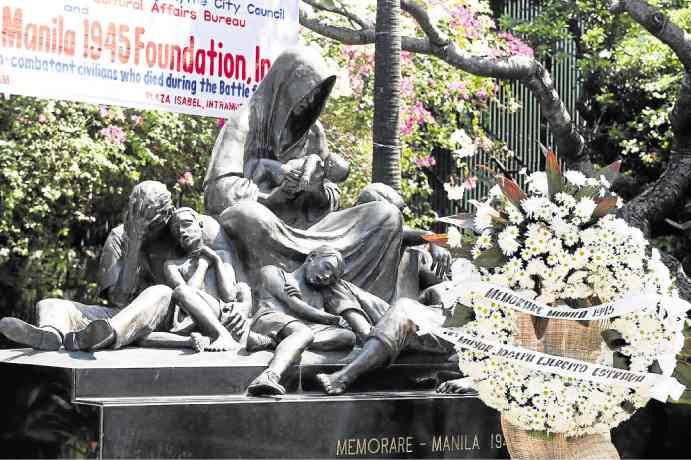In view of the recent visit of Japanese Emperor Akihito and Empress Michiko to the country, members of Memorare-Manila 1945 Foundation Inc. said they were disappointed that the royal couple made no formal apology to the families of World War II victims, particularly those who perished in the Battle of Manila.
“People have already forgotten [the war atrocities], but we’re trying to keep the memories alive,” Lourdes Montinola said on Saturday as the group marked the battle’s 71st anniversary at the Memorare-Manila monument at the corner of General Luna and Anda Streets in Intramuros.
The imperial couple, she said, “should have come here” at the monument, which depicts the tragedy with a statue of the wounded, the starving, the dying, with a sorrowful mother figure at the center. “It’s about time we moved forward, but on the other hand we still want an apology, not just a statement of remorse.”
As part of the Axis powers, expansionist Japan went to war under the reign of Akihito’s father, Hirohito. More than 100,000 civilians died in 30 days—from Feb. 3 to March 3, 1945—during the fierce fighting between Japanese invaders and US troops in the liberation of Manila.
Montinola praised the efforts of schools like Far Eastern University, noting its library’s rich collection of books about the war, and the Japanese organization Bridge for Peace (BFP).
BFP was established in 2004 by Naoko Jin, who came to the Philippines in 2000 as a university student on a study tour but was met with hostility by a widow of a Filipino soldier taken by the Japanese Army during the war.
BFP started out as a video-message project, with Jin shooting footage of Japanese soldiers apologizing for their war crimes, and bringing the clips to the Philippines to be shown to the survivors or their families. As the organization grew, Jin and her team also shot videos of Filipinos sharing their war stories, and had them shown in Japan.
Yuki Aso, 30, a BFP volunteer who attended Saturday’s event, said he recently interviewed a Filipino soldier’s son who recounted how his father was thrown into a well by Japanese troops. “He took us to the well where his father remained buried,” Aso said.
“Through these interviews we learn about fathers who were killed, mothers who became comfort women. The hatred is still there [when they share their stories]. They are hoping for an apology and compensation,” said Aso, who has been going around the country for the past three days.
When he returns to Japan, Aso said the BFP will hold workshops to showcase their interviews to their compatriots. “What we do is open opportunities for the future development of more peaceful civil societies.”
Prof. Randy David, the event’s guest speaker, said: “Without taking anything away from the Japanese emperor’s message of remorse, I think it is important to remark upon the underlying subtext of such official statements.
“These are, for obvious reasons, carefully crafted statements, meant to balance, on the one hand, the need to manifest and convey deep regret over events that caused untold suffering to many ordinary Filipinos; and, on the other, the obligation to recognize the sacrifices of the Japanese soldiers who fought loyally in that brutal war.
“We are confronted here with two conflicting situations, and I’m afraid there is no easy way to reconcile them. Beyond simply expressing remorse in order to appease the aggrieved, the aggressor must take responsibility; otherwise, atrocity becomes just another abstract phenomenon,” said David, who is also an Inquirer columnist.
